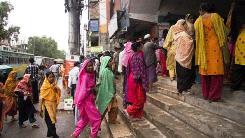By Tithe Farhana* | IDN-InDepth NewsAnalysis
DHAKA (IDN) – Salma Khatun (25), a victim of early marriage divorced by her husband, came to Dhaka, the capital of Bangladesh, in 2009 along with her two daughters, accompanied by her sister Shikka, a worker in a local Ready-Made Garments (RMG) factory in the city’s Mirpur area.
“I was very vulnerable due to getting divorce from my husband and also thinking about my daughters’ future. Subsequently, my sister insisted that I come with her.” With her help, she got a job in the factory, which gave her economic freedom and appeared to ensure the future of her daughters.
Salma is one among several women working in Bangladesh’s RMG sector, which is the biggest earner of foreign currency and largest employer in the country. It contributes significantly to GDP (Gross Domestic Product) and provides employment to 4.2 million, about 50 percent of them are women from rural areas.
In fact the garment industry has provided employment opportunities to women from the rural areas that previously did not have any opportunity to be part of the formal workforce. This has given them the chance to be financially independent and have a voice in the family because now they contribute financially.
However, women workers are confronted with many problems. Most women come from low income families. Low wage of women workers and their compliance have enabled the industry to compete with the world market. Women are paid far less than men mainly due to their lack education.
In the early 1980s, there were only 50 RMG factories employing a few thousand people. Currently, there are about 5,000 manufacturers operating in Dhaka and Chittagong, the main seaport and country’s second largest city located in south-east.
About 76% to Bangladesh’s export earning is attributed to the RMG sector, which contributes 13% GDP, up from only 3% in 1990. USA, Germany, Spain, Canada, England, France, Belgium and other EU countries are the biggest consumers and the largest importers of Bangladeshi RMG industry.
Women’s economic empowerment
Bangladesh’s RMG sector is fruit of economic globalization that mingles development and market economy, creates consumerism and employment.
1950 was the beginning of RMG in the western world. In order to regulate the level of imported RMG products from developing countries into developed countries, the Multi Fibre Agreement (MFA) was reached in 1974.
The MFA agreement imposed an export rate of 6% increase every year from a developing country to a developed country. In the early 1980s Bangladesh started receiving investment in the RMG sector. Some Bangladeshis received free training from the Korean Company Daewoo. After these workers came back to Bangladesh, many of them broke ties with the factory they were working for and started their own factories with the aim of contributing to boosting the economy.
On the one hand, the RMG sector provides freedom to the marginal and rural women and makes available a chance to be economically self-sufficient and have a voice in the family .This financial capacity is also playing a major role to macro-economy of Bangladesh since women in RMG sector are one of the leading working force for earning foreign currency.
On the other hand, women employees are victims of oppression financially and socially since they are paid low wages. Of late, garment industry workers have been protesting against law wages and for being given other labor rights.
Labour rights
Controversy has been triggered by human rights activists as a result of current industrial accidents and deaths of workers in Bangladesh.
On April 24, 2013, the biggest catastrophe in the history of Bangladesh’s RMG sector shocked the global public: an eight-story commercial building, the Rana Plaza, collapsed in Savar, Dhaka. Around 1,124 people died and approximately 2,500 people were injured.
The causalities were so intense that the international community expressed deep concern, and even Pope Francis spoke out against the working conditions in the RMG sector: “. . .many brothers and sisters find themselves in this situation, not playing fairly, not giving jobs because you are only looking at a balance sheet.”
The US government suspended Bangladesh from the Generalized System of Preferences (GSP), which allows duty free entry of over 5,000 types of goods to the United States market from the least developed countries.
 There will continue to be increasing pressure on the government to improve working conditions, and the European Union and several European importers have already come forward to tackle the situation and support the restoration of the RMG sector.
There will continue to be increasing pressure on the government to improve working conditions, and the European Union and several European importers have already come forward to tackle the situation and support the restoration of the RMG sector.
*Tithe Farhana is contributing writer at Digital Development Debates, Freelancer at SciDev.Net and a member of the International Environmental Communication Association. [IDN-InDepthNews – December 21, 2013]
2013 IDN-InDepthNews | Analysis That Matters
Top left image: Bangladesh garment factory workers | Credit: Taslima Akhter – CleanClothesCampaign
Bottom left photo: The Writer | Credit: Women’s Worldwide Web
Send your comment | Subscribe to IDN newsletter
Follow us on Twitter and Facebook:
http://twitter.com/InDepthNews
http://www.facebook.com/IDN.GoingDeeper

